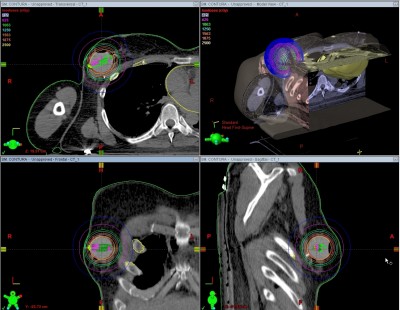
Patients with early-stage breast cancer are often treated with lumpectomy followed by radiation therapy. Traditional whole breast radiation is burdensome (4-6 weeks of daily treatments) and results in radiation dose to the heart, lungs and skin. Intraoperative radiation therapy (IORT) has become an increasingly popular alternative to whole breast irradiation as it involves one radiation treatment at the time of breast surgery and results in a lower dose to normal structures.
Precision Breast IORT is a unique form of IORT developed at UVA — now being examined in a Phase II clinical trial — that incorporates CT imaging and high-dose rate (HDR) brachytherapy, allowing the breast cancer specialists at UVA to provide an individualized radiation treatment to their patients. When compared to conventional IORT, Precision Breast IORT involves a higher dose of radiation directed to the area of the breast where the tumor was removed, while sculpting the dose away from the breast, lung and skin.
Data from the initial phase I study showed that the treatment is both safe and feasible, says the study’s principal investigator, UVA breast surgical oncologist Shayna Showalter, MD. “There have been no major adverse side effects or safety issues, and the cosmetic outcomes and quality of life scores have been high for those patients who have been treated with Precision Breast IORT thus far,” says Showalter. “We are now enrolling patients into a large phase II study that is designed to estimate the efficacy of Precision Breast IORT. We hypothesize that the addition of intraoperative imaging and HDR brachytherapy will increase the efficacy of IORT.”
The phase II study (IRB# 18004) will enroll 290 women aged 45 and older with a diagnosis of Stage 0 or Stage 1 breast cancer. UVA specialists will follow patients for a minimum of five years.
“Precision Breast IORT is a potential alternative to adjuvant radiation therapy for our patients with early-stage breast cancer. Radiation treatment time is reduced from 4 to 6 weeks to a single day, allowing women to return to their normal lives quickly. Unfortunately, many women are not aware that Precision Breast IORT is available,” says Showalter. “We hope that referring physicians will inform patients with early-stage breast cancer that this may be a viable option for them.”
Learn more about Precision Breast IORT.
To refer your patient for the Precision Breast IORT Phase II study, contact Debbie Romano, RN, care coordinator for the breast IORT program, at 434.297.4041 or reach out to our Referral Services team for further assistance.